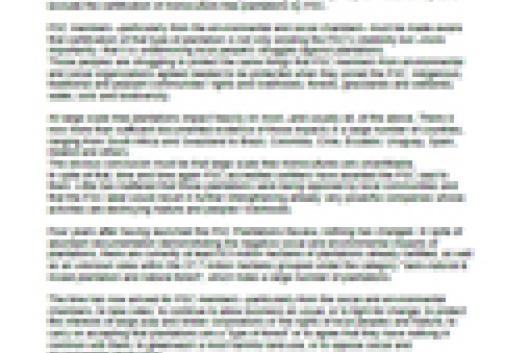In the framework of the Latin American forum on
“Large scale monocultures in Latin America, land grabbing
and threats to biodiversity and food sovereignty”
September 6-11, 2014 - Garifuna Territory, Honduras
We, representatives of organizations from different countries of Latin America and international networks, met together in La Ceiba, Honduras, have ascertained from local testimonies the serious situation faced by peasants, indigenous and Garifuna communities due to the voracious advance of monocultures of African palm.
African palm monocultures in Honduras, as in many tropical countries where they have been imposed, are part of a production model based on land grabbing in order to generate profits for a handful of national entrepreneurs and transnational corporations. In most cases, local and national governments work hand-in-glove with the palm oil companies, with their officials or political operators twisting the laws to favour big capital.
The situation in Honduras reflects what is happening in many countries in Latin America, Africa and Asia where agribusiness is being pushed in the guise of “development” projects. These often focus on production of biofuels or “renewable energies” to counteract climate change; however, they are a phony solution that only exacerbates climate change. The only possible solution to this tragic reality is an urgent change in the global model of production and consumption.
We express our solidarity with the Garifuna, indigenous and peasants peoples of Honduras in the great challenges they face for the defense of their territory, due to the imposition of projects with high social, environmental and cultural impact, like African palm monocultures. We salute the brave defense that women and men among these peoples – in spite of their adverse living conditions – are undertaking to demand that the Honduran state protect their fundamental human rights.
We energetically denounce the serious violations of human rights, the dispossession and forced displacement of peoples, the criminalization of the struggle in defence of their territories, and the threats and persecution they have been subjected to for years in favour of business interests, to the clear detriment of collective rights.
In the view of the Honduran Black Fraternity Organization (OFRANEH), the expansion and imposition of monocultures is an expression of environmental racism arising from the state itself, which has trampled on the historical rights of the Garifuna, indigenous and peasants peoples over their territories and their collective rights, acting instead to favour national and transnational business interests in palm oil and other monocultures. This model has been implemented with the backing of policies promoted by the Honduran state itself, and with the complicity of its various government agencies.
We publicly denounce that expansion of African palm cultivation has caused loss and destruction of forests and wetlands; diversion of river courses and reduction of their water levels; water and soil pollution due to the use of agrotoxics in large scale monocultures, with a direct impact on the health of men, women, children and the elderly in nearby communities.
We are extremely concerned about the impact of palm monocultures on the food sovereignty of local populations. Land which used to produce food has now been converted to vast plantations of African palm, and local communities now have to import their food. In addition to food price rises, this means enforced changes in diet.
The resulting changes to their way of life have affected the cultural and spiritual heritage of these peoples, whose customs, traditions, legends, ancestral knowledge and religions are profoundly connected to their territories and the earth.
In this context, we are particularly concerned by the Honduran state’s drive to create Special Development Zones (ZEDES), known as “Model Cities,” especially its plans to impose them in the Honduran Pacific region and in Garifuna territory. If these projects go through, local populations will be displaced and their human rights will again be infringed. This social and environmental reality is exacerbated when it coincides with other interests and high impact activities, including mining and oil extraction.
In light of the above, together with popular organizations in Honduras, we raise our voices to call attention to the seriousness of this situation. We demand that the Honduran government recognize and restore the ancestral territorial rights of Garifuna, indigenous and peasants peoples. In accordance with international treaties and conventions on human rights, we call for recognition of the social and environmental harm done, and for those responsible to be punished.
Alianza por la Biodiversidad (Biodiversity Alliance), ATALC (Friends of the Earth Latin America & Caribbean), WRM (World Rainforest Movement), RECOMA (Latin American Network against Tree Plantations), Rel-UITA (IUF Latin American Regional).
